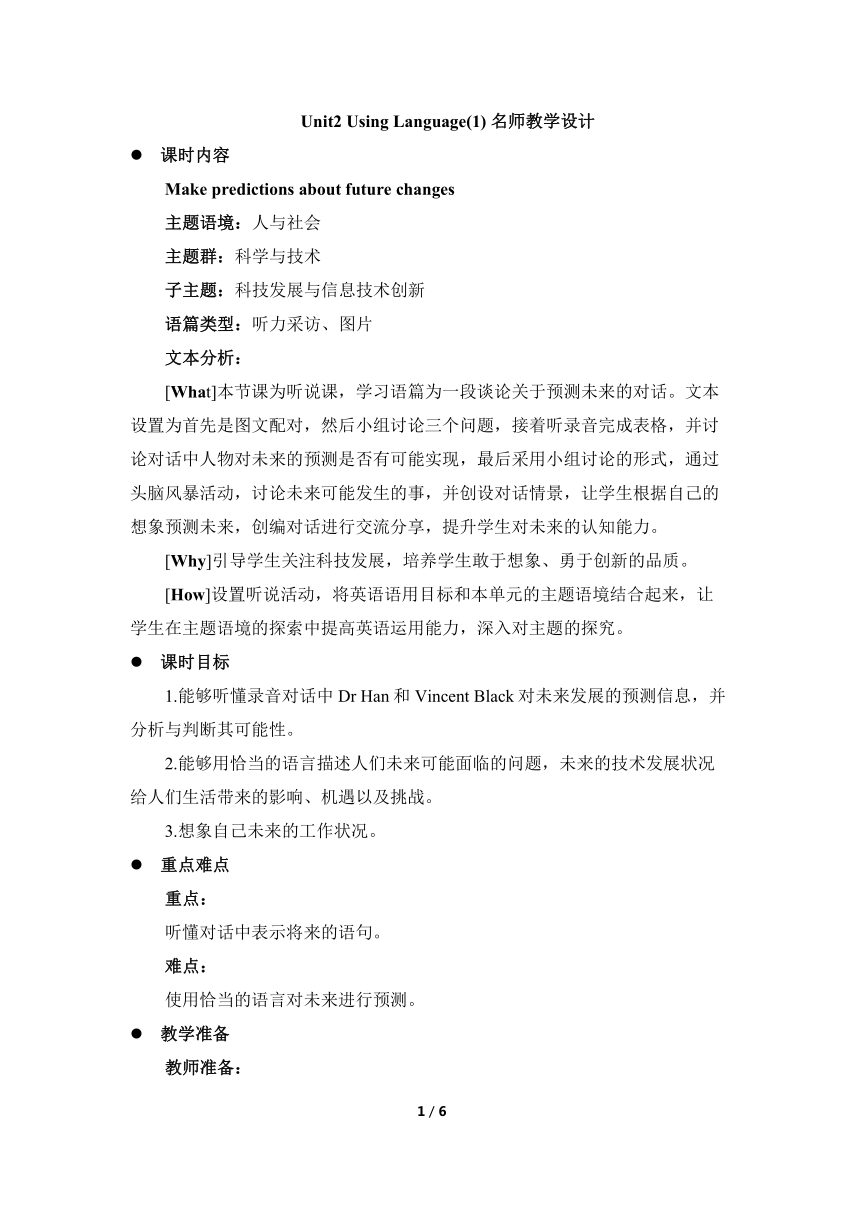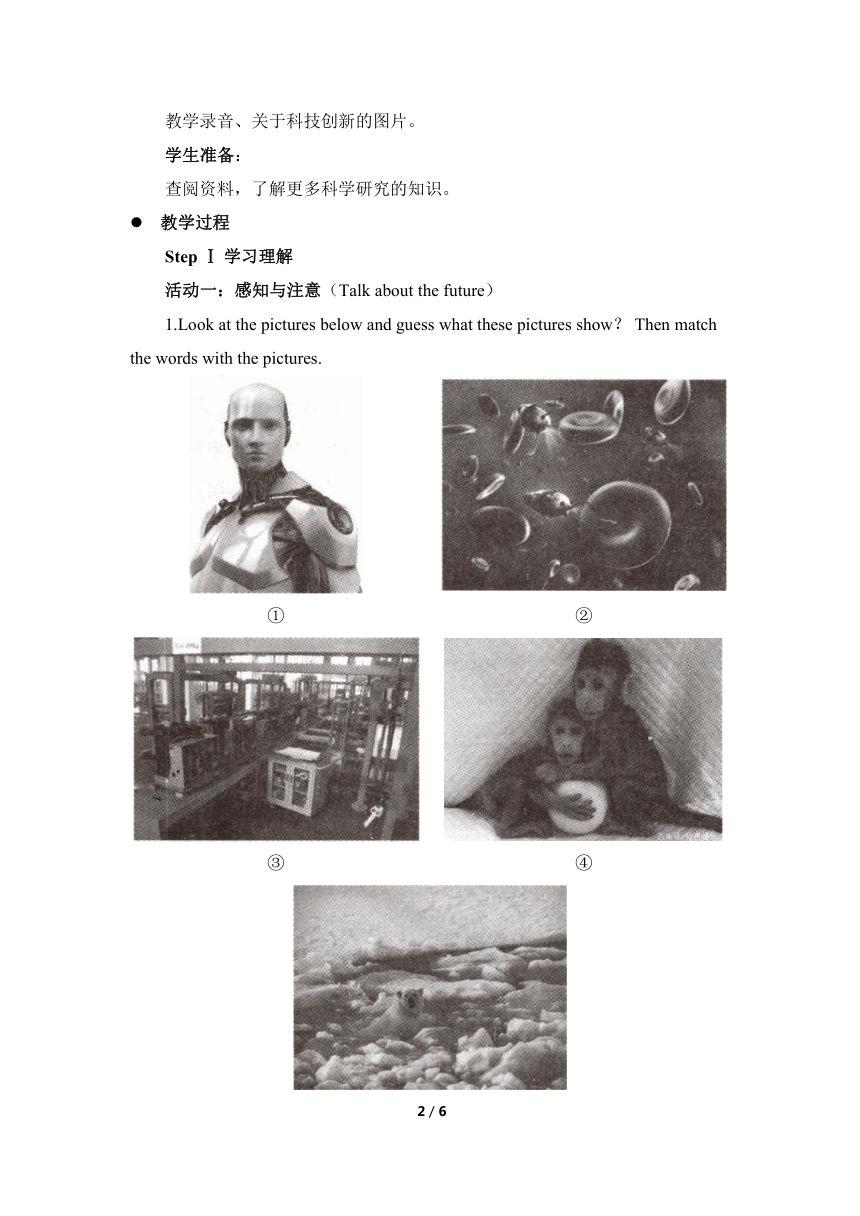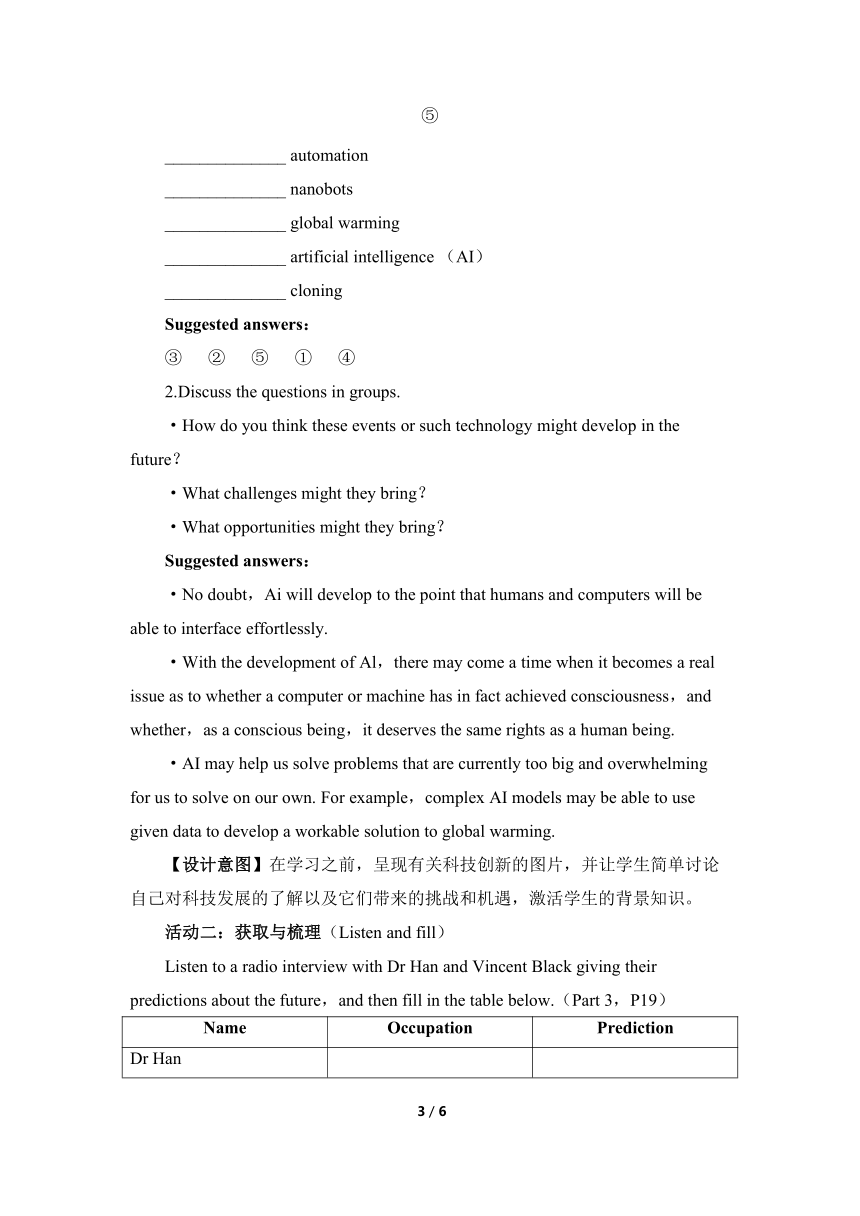人教版(2019)选择性必修 第一册Unit 2 Looking into the Future Using Language(1) 名师教学设计
文档属性
| 名称 | 人教版(2019)选择性必修 第一册Unit 2 Looking into the Future Using Language(1) 名师教学设计 |  | |
| 格式 | docx | ||
| 文件大小 | 1.4MB | ||
| 资源类型 | 教案 | ||
| 版本资源 | 人教版(2019) | ||
| 科目 | 英语 | ||
| 更新时间 | 2023-03-11 14:29:01 | ||
图片预览



文档简介
Unit2 Using Language(1) 名师教学设计
课时内容
Make predictions about future changes
主题语境:人与社会
主题群:科学与技术
子主题:科技发展与信息技术创新
语篇类型:听力采访、图片
文本分析:
[What]本节课为听说课,学习语篇为一段谈论关于预测未来的对话。文本设置为首先是图文配对,然后小组讨论三个问题,接着听录音完成表格,并讨论对话中人物对未来的预测是否有可能实现,最后采用小组讨论的形式,通过头脑风暴活动,讨论未来可能发生的事,并创设对话情景,让学生根据自己的想象预测未来,创编对话进行交流分享,提升学生对未来的认知能力。
[Why]引导学生关注科技发展,培养学生敢于想象、勇于创新的品质。
[How]设置听说活动,将英语语用目标和本单元的主题语境结合起来,让学生在主题语境的探索中提高英语运用能力,深入对主题的探究。
课时目标
1.能够听懂录音对话中 Dr Han和 Vincent Black对未来发展的预测信息,并分析与判断其可能性。
2.能够用恰当的语言描述人们未来可能面临的问题,未来的技术发展状况给人们生活带来的影响、机遇以及挑战。
3.想象自己未来的工作状况。
重点难点
重点:
听懂对话中表示将来的语句。
难点:
使用恰当的语言对未来进行预测。
教学准备
教师准备:
教学录音、关于科技创新的图片。
学生准备:
查阅资料,了解更多科学研究的知识。
教学过程
Step Ⅰ 学习理解
活动一:感知与注意(Talk about the future)
1.Look at the pictures below and guess what these pictures show? Then match the words with the pictures.
① ②
③ ④
⑤
______________ automation
______________ nanobots
______________ global warming
______________ artificial intelligence (AI)
______________ cloning
Suggested answers:
③ ② ⑤ ① ④
2.Discuss the questions in groups.
·How do you think these events or such technology might develop in the future?
·What challenges might they bring?
·What opportunities might they bring?
Suggested answers:
·No doubt,Ai will develop to the point that humans and computers will be able to interface effortlessly.
·With the development of Al,there may come a time when it becomes a real issue as to whether a computer or machine has in fact achieved consciousness,and whether,as a conscious being,it deserves the same rights as a human being.
·AI may help us solve problems that are currently too big and overwhelming for us to solve on our own. For example,complex AI models may be able to use given data to develop a workable solution to global warming.
【设计意图】在学习之前,呈现有关科技创新的图片,并让学生简单讨论自己对科技发展的了解以及它们带来的挑战和机遇,激活学生的背景知识。
活动二:获取与梳理(Listen and fill)
Listen to a radio interview with Dr Han and Vincent Black giving their predictions about the future,and then fill in the table below.(Part 3,P19)
Name Occupation Prediction
Dr Han
Vincent Black
Suggested answers:
Dr Han
·Occupation:computer scientist
·Prediction:Computers will be cleverer than us in the future;people will also be programming computers to think like humans;we’ll be programming them to not think in ways that may harm humans;we’ll also be creating machines to help people internally.
Vincent Black
·Occupation:architect
·Prediction:There will be cities floating on water and people could move into housing in cities that float.
活动三:分析与判断(Discuss about the future)(Part 4,P19)
Work in pairs. Discuss whether you think Dr Han and Vincent Black’s predictions are possible. Why or why not?
Suggested answers:
I agree on Dr Han’s idea that computers will be cleverer than us in the future. Actually there are already computers,like AlphaGo,which are smarter than most people.
I don’t agree on Vincent Black’s idea about floating cities,because I doubt that sea levels will rise that much.
【设计意图】听录音,获取对话中人物对未来的预测,完成表格;小组讨论录音中人物的预测是否能实现,并说明原因。通过这个活动,学生获取了对未来信息的预测,有利于形成对科技创新精神的认识,也学习了对未来事物进行预测的语用功能句。
Step Ⅱ 应用实践
活动四:描述与阐释(Describe about the future)
1.语言学习(Making predictions)
I think/believe/predict that in the future... My prediction is that... By 2030,we will... In the (distant) future there will... I can imagine/forecast... 1 doubt/don’t think that... One challenge will be... We will have the opportunity to... We will be doing.... We are going to...
2.描述(Describe about the future)
In groups,brainstorm about the future. Discuss these points.
·future events or problems the world might face
·future technologies
·how these things will change the way we live
·the challenges and opportunities these things might bring
3.展示活动(Mind map)
Ask students to show their ideas in groups and finish the mind map with words and phrases.
【设计意图】在口语对话之前,教师帮助学生收集一些谈论将来的词语和句式,学生通过思考和积累,获取这些语用知识,为口语活动提供背景常识和语言结构,使得有话可说。然后通过小组讨论活动让学生交流自己对未来可能发生的事情的看法,将所学文化知识与语言知识应用到对主题意义的探究过程中。该活动既可以内化所学知识又能够帮助学生形成对科技创新的认识,从而实现核心素养的落地生根。
Step Ⅲ 迁移创新
活动五:想象与创造(An interview)
1.Imagine that you have a job that makes you an expert in the future. In pairs,interview each other aboutyour jobs and predictions. Use the expressions you have learnt to help you.
2.Ask students to make predictions about the future,and then report back to the class.
【设计意图】在英语课堂教学中,通过设定特定的场景,让学生想象自己在未来所从事的职业,使他们在轻松愉快的环境中学习,激发学生主动学习的愿望,发展学生语言运用能力,帮助学生理解未来的职业以及科技发展给人们生活带来的变化。
板书设计
Unit 2 Looking into the Future Period Ⅳ Using Language (1) Ⅰ.学习理解 活动一:感知与注意(Talk about the future) 1.Look and match. 2.Discuss the questions in groups. 活动二:获取与梳理(Listen and fill) 活动三:分析与判断(Discuss about the future) Ⅱ.应用实践 活动四:描述与阐释(Describe about the future) 1.语言学习(Making predictions) 2.描述(Describe about the future) 3.展示活动(Mind map) Ⅲ.迁移创新 活动五:想象与创造(An interview)
2 / 2
课时内容
Make predictions about future changes
主题语境:人与社会
主题群:科学与技术
子主题:科技发展与信息技术创新
语篇类型:听力采访、图片
文本分析:
[What]本节课为听说课,学习语篇为一段谈论关于预测未来的对话。文本设置为首先是图文配对,然后小组讨论三个问题,接着听录音完成表格,并讨论对话中人物对未来的预测是否有可能实现,最后采用小组讨论的形式,通过头脑风暴活动,讨论未来可能发生的事,并创设对话情景,让学生根据自己的想象预测未来,创编对话进行交流分享,提升学生对未来的认知能力。
[Why]引导学生关注科技发展,培养学生敢于想象、勇于创新的品质。
[How]设置听说活动,将英语语用目标和本单元的主题语境结合起来,让学生在主题语境的探索中提高英语运用能力,深入对主题的探究。
课时目标
1.能够听懂录音对话中 Dr Han和 Vincent Black对未来发展的预测信息,并分析与判断其可能性。
2.能够用恰当的语言描述人们未来可能面临的问题,未来的技术发展状况给人们生活带来的影响、机遇以及挑战。
3.想象自己未来的工作状况。
重点难点
重点:
听懂对话中表示将来的语句。
难点:
使用恰当的语言对未来进行预测。
教学准备
教师准备:
教学录音、关于科技创新的图片。
学生准备:
查阅资料,了解更多科学研究的知识。
教学过程
Step Ⅰ 学习理解
活动一:感知与注意(Talk about the future)
1.Look at the pictures below and guess what these pictures show? Then match the words with the pictures.
① ②
③ ④
⑤
______________ automation
______________ nanobots
______________ global warming
______________ artificial intelligence (AI)
______________ cloning
Suggested answers:
③ ② ⑤ ① ④
2.Discuss the questions in groups.
·How do you think these events or such technology might develop in the future?
·What challenges might they bring?
·What opportunities might they bring?
Suggested answers:
·No doubt,Ai will develop to the point that humans and computers will be able to interface effortlessly.
·With the development of Al,there may come a time when it becomes a real issue as to whether a computer or machine has in fact achieved consciousness,and whether,as a conscious being,it deserves the same rights as a human being.
·AI may help us solve problems that are currently too big and overwhelming for us to solve on our own. For example,complex AI models may be able to use given data to develop a workable solution to global warming.
【设计意图】在学习之前,呈现有关科技创新的图片,并让学生简单讨论自己对科技发展的了解以及它们带来的挑战和机遇,激活学生的背景知识。
活动二:获取与梳理(Listen and fill)
Listen to a radio interview with Dr Han and Vincent Black giving their predictions about the future,and then fill in the table below.(Part 3,P19)
Name Occupation Prediction
Dr Han
Vincent Black
Suggested answers:
Dr Han
·Occupation:computer scientist
·Prediction:Computers will be cleverer than us in the future;people will also be programming computers to think like humans;we’ll be programming them to not think in ways that may harm humans;we’ll also be creating machines to help people internally.
Vincent Black
·Occupation:architect
·Prediction:There will be cities floating on water and people could move into housing in cities that float.
活动三:分析与判断(Discuss about the future)(Part 4,P19)
Work in pairs. Discuss whether you think Dr Han and Vincent Black’s predictions are possible. Why or why not?
Suggested answers:
I agree on Dr Han’s idea that computers will be cleverer than us in the future. Actually there are already computers,like AlphaGo,which are smarter than most people.
I don’t agree on Vincent Black’s idea about floating cities,because I doubt that sea levels will rise that much.
【设计意图】听录音,获取对话中人物对未来的预测,完成表格;小组讨论录音中人物的预测是否能实现,并说明原因。通过这个活动,学生获取了对未来信息的预测,有利于形成对科技创新精神的认识,也学习了对未来事物进行预测的语用功能句。
Step Ⅱ 应用实践
活动四:描述与阐释(Describe about the future)
1.语言学习(Making predictions)
I think/believe/predict that in the future... My prediction is that... By 2030,we will... In the (distant) future there will... I can imagine/forecast... 1 doubt/don’t think that... One challenge will be... We will have the opportunity to... We will be doing.... We are going to...
2.描述(Describe about the future)
In groups,brainstorm about the future. Discuss these points.
·future events or problems the world might face
·future technologies
·how these things will change the way we live
·the challenges and opportunities these things might bring
3.展示活动(Mind map)
Ask students to show their ideas in groups and finish the mind map with words and phrases.
【设计意图】在口语对话之前,教师帮助学生收集一些谈论将来的词语和句式,学生通过思考和积累,获取这些语用知识,为口语活动提供背景常识和语言结构,使得有话可说。然后通过小组讨论活动让学生交流自己对未来可能发生的事情的看法,将所学文化知识与语言知识应用到对主题意义的探究过程中。该活动既可以内化所学知识又能够帮助学生形成对科技创新的认识,从而实现核心素养的落地生根。
Step Ⅲ 迁移创新
活动五:想象与创造(An interview)
1.Imagine that you have a job that makes you an expert in the future. In pairs,interview each other aboutyour jobs and predictions. Use the expressions you have learnt to help you.
2.Ask students to make predictions about the future,and then report back to the class.
【设计意图】在英语课堂教学中,通过设定特定的场景,让学生想象自己在未来所从事的职业,使他们在轻松愉快的环境中学习,激发学生主动学习的愿望,发展学生语言运用能力,帮助学生理解未来的职业以及科技发展给人们生活带来的变化。
板书设计
Unit 2 Looking into the Future Period Ⅳ Using Language (1) Ⅰ.学习理解 活动一:感知与注意(Talk about the future) 1.Look and match. 2.Discuss the questions in groups. 活动二:获取与梳理(Listen and fill) 活动三:分析与判断(Discuss about the future) Ⅱ.应用实践 活动四:描述与阐释(Describe about the future) 1.语言学习(Making predictions) 2.描述(Describe about the future) 3.展示活动(Mind map) Ⅲ.迁移创新 活动五:想象与创造(An interview)
2 / 2
